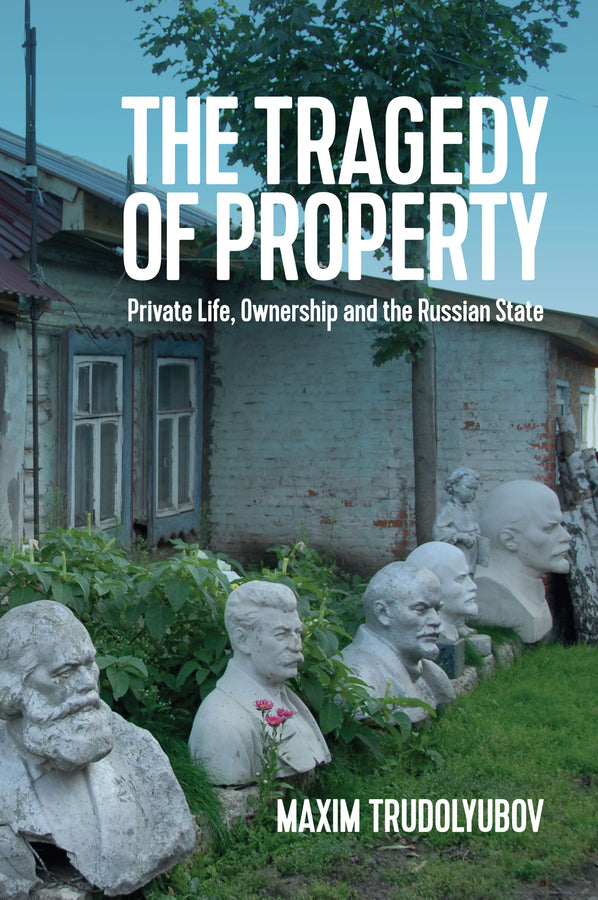Description
Discover the profound insights of 'The Tragedy of Property,' a captivating exploration of Russian political culture through the lens of private ownership. Authored by Maxim Trudolyubov and published by John Wiley & Sons in 2018, this brand new hardcover book examines the unique relationship between property and power in Russia. Unlike in many Western societies where private property serves as a shield against government intervention, Russian history reveals property as a state control tool. Through vivid historical analysis, Trudolyubov highlights how Nineteenth-century liberals dismissed property rights, viewing them as a remnant of serfdom and aristocracy. After the revolutionary upheaval of 1917, property ownership transformed, especially with mass housing's rise in the 1960s, as citizens sought their own space amidst state control.
With 220 pages of rich illustrations and compelling narratives, this book is essential for anyone interested in Russian history, political culture, and property rights. It's perfect for readers who want to understand the complexities of ownership in a post-Soviet context, including why many Russian entrepreneurs choose offshore investments. Experience an enlightening journey through Russia’s tumultuous past and see how property continues to shape the nation's identity.
Note: Shipping for this item is free. Please allow up to 6 weeks for delivery. Once your order is placed, it cannot be cancelled.
Condition: BRAND NEW. ISBN: 9781509527014.
Note: Shipping for this item is free. Please allow up to 6 weeks for delivery. Once your order is placed, it cannot be cancelled.
Condition: BRAND NEW
ISBN: 9781509527014
Year: 2018
Publisher: John Wiley & Sons (UK)
Pages: 220
Description:
Russian novels, poetry and ballet put the country squarely in the European family of cultures and yet there is something different about this country, especially in terms of its political culture. What makes Russia different? Maxim Trudolyubov uses private property as a lens to highlight the most important features that distinguish Russia as a political culture. In many Western societies, private property has acted as the private individual™s bulwark against the state; in Russia, by contrast, it has mostly been used by the authorities as a governance tool. Nineteenth-century Russian liberals did not consider property rights to be one of the civil causes worthy of defending. Property was associated with serfdom, and even after the emancipation of the serfs the institution of property was still seen as an attribute of retrograde aristocracy and oppressive government. It was something to be destroyed “ and indeed it was, in 1917. Ironically, it was the Soviet Union that, with the arrival of mass housing in the 1960s, gave the concept of private ownership a good name. After forced collectivization and mass urbanization, people were yearning for a space of their own. The collapse of the Soviet ideology allowed property to be called property, but not all properties were equal. You could own a flat but not an oil company, which could be property on paper but not in reality. This is why most Russian entrepreneurs register their businesses in offshore jurisdictions and park their money abroad.This fresh and highly original perspective on Russian history will be of great interest to anyone who wants
With 220 pages of rich illustrations and compelling narratives, this book is essential for anyone interested in Russian history, political culture, and property rights. It's perfect for readers who want to understand the complexities of ownership in a post-Soviet context, including why many Russian entrepreneurs choose offshore investments. Experience an enlightening journey through Russia’s tumultuous past and see how property continues to shape the nation's identity.
Note: Shipping for this item is free. Please allow up to 6 weeks for delivery. Once your order is placed, it cannot be cancelled.
Condition: BRAND NEW. ISBN: 9781509527014.
Note: Shipping for this item is free. Please allow up to 6 weeks for delivery. Once your order is placed, it cannot be cancelled.
Condition: BRAND NEW
ISBN: 9781509527014
Year: 2018
Publisher: John Wiley & Sons (UK)
Pages: 220
Description:
Russian novels, poetry and ballet put the country squarely in the European family of cultures and yet there is something different about this country, especially in terms of its political culture. What makes Russia different? Maxim Trudolyubov uses private property as a lens to highlight the most important features that distinguish Russia as a political culture. In many Western societies, private property has acted as the private individual™s bulwark against the state; in Russia, by contrast, it has mostly been used by the authorities as a governance tool. Nineteenth-century Russian liberals did not consider property rights to be one of the civil causes worthy of defending. Property was associated with serfdom, and even after the emancipation of the serfs the institution of property was still seen as an attribute of retrograde aristocracy and oppressive government. It was something to be destroyed “ and indeed it was, in 1917. Ironically, it was the Soviet Union that, with the arrival of mass housing in the 1960s, gave the concept of private ownership a good name. After forced collectivization and mass urbanization, people were yearning for a space of their own. The collapse of the Soviet ideology allowed property to be called property, but not all properties were equal. You could own a flat but not an oil company, which could be property on paper but not in reality. This is why most Russian entrepreneurs register their businesses in offshore jurisdictions and park their money abroad.This fresh and highly original perspective on Russian history will be of great interest to anyone who wants

